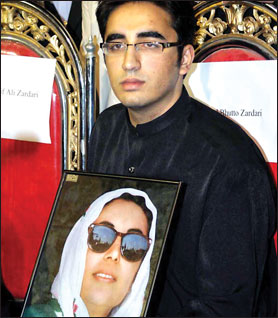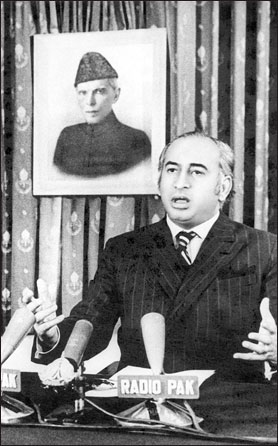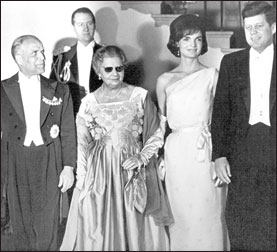|
|
| |
instep
comment
Our fascination with dynasty
Dynasties should logically play no part in the politics of democracy,
but they do... because we remain spellbound by them.
By
Muniba Kamal |
| |
| Elections
are nigh and the debates are on. One of the biggest issues raging
since the PPP press conference after Benazir's assassination is that
of how dynasties hinder the political process. This is the press conference
in which Bilawal Zardari's name was amended to Bilawal Bhutto Zardari,
where Asif Zardari announced that he too wished to be buried at Garhi
Khuda Bux and the crowds at Naudero that day referred to him as Asif
Bhutto in their slogans. They had to. After all naaras (slogans) are
the essence of political activism in the country and 'Har ghar se
Zardari nikle ga, tum kitne Zardari maro ge', does not have any resonance
whatsoever. Hence it becomes important for the name Bhutto to continue,
otherwise, the PPP will have to rewrite every slogan in the book and
that is impossible to conceive. They have the most powerful slogans
in the country and they are all derived from the legend of the Bhutto
dynasty which became mythical after Zulfikar Ali Bhutto's execution.
Benazir's assassination at the tail end of 2007 reinforced that myth
with the fresh blood of reality. |
 |
| |
| After
a suitable mourning period various commentators let lose on how wrong
this was and how undemocratic it is. And while from an idealistic
standpoint, one does agree, the power of dynasties cannot be denied.
After all, even in the United Kingdom, where Margaret Thatcher became
Prime Minister in 1979, it is still Lady Diana Spencer who has spawned
more books. The People's Princess will always be a better sell than
any people's Prime Minister in a country as progressive as the UK.
The fascination with dynasty, with people who are larger than life
is a universal phenomenon. And while one agrees that to have a monarchist
set up is regressive in a democracy, it seems that the raging debates
here at home and around the world belittle the power of dynasties,
political or otherwise. |
| |
America,
the bastion of democracy in the free world still dreams of Camelot,
the Kennedy years have become the stuff of legend because of the progressive
John F. Kennedy but largely because of the sublime touch that Jackie
Bouvier Kennedy (and later Onassis) brought with her to the White
House. For the first time America had a Preident and a First Lady
that were more glamourous than any royal family in the world. They
had in Jackie a First Lady who understood the power of culture and
history and linked the two by setting up a White House fine arts commission,
procured art, antiques and objects, revamped the Presidential residence
and proceeded to give America a visual tour of their own history that
was broadcast on three television channels.
Jackie understood the power of television only to well and so did
Jack, because he let her. And these gestures added value to the Kennedy
years over and above Presidents who just gave the America speeches
on matters of national interest. Ironically enough, it was the violent
television images on November 22 1963 that ensured that the Kennedy
myth lived on, of the couple cruising the streets of Dallas in a convertible,
waving to cheering crowds, of shots being fired, Kennedy slumping
down, Jackie stunned, with his blood spattered on her pink Schiaparelli
suit. Those images are still remembered by people around the world
and obviously resonate the most with the American people.
|
 |
| |
The
closest parallel that we have to that moment in history is Benazir
Bhutto's assassination. We saw her go down as she waved to the crowds
in Rawalpindi. We felt the pall of inconceivable gloom come down all
over our burning country. We saw her grave being dug next to her father's
who was executed three decades ago. We saw people from all over Sindh
making their way to Naudero. We waited with bated breath for the press
conference and to know her will. We saw and felt for Bilawal, Bakhtawar
and Asifa, indeed we grieved with them. And our hearts went out to
their cousins Fatima and Zulfikar Bhutto who wept for their slain
aunt in death even though they were not on talking terms in real life.
Our emotions were compounded by the fact that we in touch with the
Bhuttos by TV.
Bilawal saying "Democracy is the best revenge," at the press
conference held after his mother's soyem was as touching for Pakistan
as the image of a three-year-old John Kennedy Jr saluting the hearse
that carried his father was for America. Perhaps that was even more
poignant because it was the silent salute of a toddler. Of course
that gesture was carefully orchestrated by Jackie Kennedy who always
had a flair for subtle drama. |
| |
She
was also responsible for the myth of 'Camelot' which the Kennedy years
were known as. After Kennedy's death, Jackie gave an interview to
Theodore White, a reporter with Life magazine, when she recalled that
President Kennedy's favourite record had been of the musical Camelot,
the theme song of which went
'Don't let it be forgot,
That once there was a spot,
For one brief shining moment
That was known as Camelot.'
"There'll never be another Camelot again," she said in that
interview. The power of the imagery she evoked was such that the word
'Camelot' came to represent the three short years she and her husband
were in the White House.
|
 |
| |
In
an interview Theodore White recalled:"So the epitaph on the
Kennedy Administration became Camelot – a magic moment in
American history, when gallant men danced with beautiful women,
when great deeds were done, when artists, writers and poets met
at the White House and the barbarians beyond the walls were held
back."
Of course, this is looking at the Kennedy years through rose tinted
glasses, but it's still better than the rather insidious dynasty
currently in power in the States – that of the House of Bush.
With Bush Sr the ex-CIA chief becoming President, the first Iraq
War, the suspiciously 'rigged' Florida ballot and Bush Jr and the
second war in Iraq – indeed makes many an American long for
Camelot. Despite their faults, the Kennedys kept the American dream
alive and came to represent it. The trials, tribulations and tragedies
of the Bhutto family are similar in that they are the stuff legends
are made of and hence their enduring legacy.
The case is the same across the border with the Nehru dynasty. The
Indian nation was horrified first with the assassination of Indira
Gandhi by one of a her own Sikh bodyguards after the Indian forces
stormed the Golden Temple the holiest of Sikh shrines killing almost
500 Sikhs. Then, the tragedy was repeated with the assassination
of Rajiv Gandhi carried out by Dhanu, a female suicide bomber sent
by the Tamil Tigers. The nation wept and the largest political party
in India suffered as Sonia Antonia Maino Gandhi shunned politics
after seeing her husband so brutally murdered. The popularity of
the Congress began to dwindle and they lost the 1996 elections.
Eventually, Sonia Gandhi decided to answer the call of duty and
rejoined the Congress in 1997. The flame of the Nehru dynasty was
lit again – so what if the woman holding it aloft was a Roman
Catholic of Italian origin? Such is the power of a dynasty known
and loved by the people.
The Congress won the next elections and Sonia Gandhi made a politically
astute decision by nominating Dr Manmohan Singh as the Prime Minister.
But she is widely regarded as the most powerful woman in India,
which is why when she visited China recently, she was given the
welcome accorded to any head of state, despite not holding an office.
With elections round the corner, much is being made of the Bhutto
dynasty and how it should not play a part in the democratic process.
And ultimately, the most poignant comment has come from Fatima Bhutto.
"The idea that it has to be a Bhutto, I think, is a dangerous
one," she told the Times in London after Bilawal was named
Benazir's heir apparent. "It doesn't benefit Pakistan. It doesn't
benefit a party that's supposed to be run on democratic lines and
it doesn't benefit us as citizens if we think only about personalities
and not about platforms."
While her reasoning is faultless, the fact that Fatima 'Bhutto'
made those comments is what made waves around the world. Other columnists
have also said the same, they haven't spawned headlines.
The Bhuttos have a grip on our collective imagination and that is
perfectly natural. Pakistan saw a fiery Zulfikar Ali Bhutto come
into power. His speeches and his tenure is still remembered for
good and bad. His untimely death made him larger than he had been
in life. And then our attention focused on Benazir and Murtaza -
the prodigal daughter and the son who became known as the Terrorist
Prince. We witnessed their rise, their differences, their eventual
fall from grace and their resurrection. And the memory of three
lives cut short is so strong. Zulfikar Ali Bhutto executed in the
still of the night. Murtaza Bhutto gunned down in Clifton under
the most dubious circumstances. Benazir Bhutto who succumbed to
the second assassination attempt while waving to the crowds that
would vote for her. Each death gives new life to the memory of the
ones before. No wonder then that the bonds that tie our imagination
to the Bhutto dynasty run deep, as deep as India's fascination with
the Gandhis and America's with the Kennedys.
I don't think it is the martyr syndrome, as some say it is. I believe
it is the thought of what could have been... and was never given
a chance. The beginning of all myths is a possibility that was never
realized.
|
| |
|

